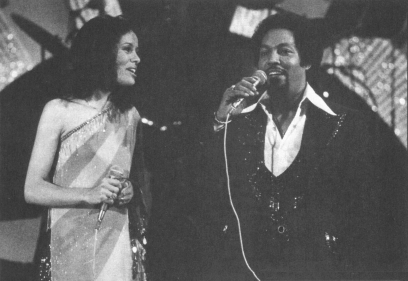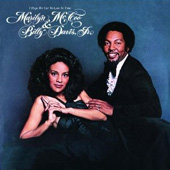|
"You Don't Have to Be a Star (To Be in My Show)" Marilyn McCoo and Billy Davis Jr. ABC 12208 Jan. 1977 Billboard: #1
The original intention was for Marilyn and Billy to have separate, solo careers. Otis Smith of ABC Records arranged for Marilyn to fly to Detroit and meet producer Don Davis, who had done important work at both Motown and Stax Records. Davis, who produced the number one "Disco Lady" for Johnnie Taylor, had recorded a half-dozen solo tracks with Marilyn when Billy decided their first projects should be an album of duets. Davis had a demo from songwriters Dames Dean and John Glover that he thought would be perfect for Marilyn and BIlly. It wasn't written as a duet, but it was quickly rearranged for the two of them to sing. "It's one of the few songs in my career where I tried to emulate the Motown sound," Davis admits. "So I made sure I got the session musicians I needed, like James Jamerson. I knew there was no way I wanted to do this record without him." Another priority was to produce a song that sounded contemporary. "I wanted to get away from any resemblance to the Fifth Dimension sound," Davis says. "I thought the Fifth Dimension had a great sound, but the needed something new and fresh." The record broke on black radio before it crossed over to pop, and although it was number one on the Hot 100, it won a Grammy in the category of Best R&B Vocal Performance by a Duo, Group or Chorus. "You Don't Have to Be a Star" was the second McCoo and Davis single. The title track of their first album, "I Hope We Get to Love on Time," was released first, but only went to number 91. After "You Don't Have to Be a Star," the duo took "Your Love" to number 15. They only had one more chart single together, "Look What You've Done to My Heart," which peaked at 51. Their success on the pop charts led to a summer variety series on CBS, The Marilyn McCoo and Billy Davis, Jr. Show. It ran for six weeks, beginning June 15, 1977. Marilyn hosted the second season of the television series, Solid Gold, and signed to RCA as a solo artist. She realeased several singles, including a duet with Billy, but none of them charted. - Fred Bronson, The Billboard Book of Number One Hits, Billboard, 1988.
No comments so far, be the first to comment. |


